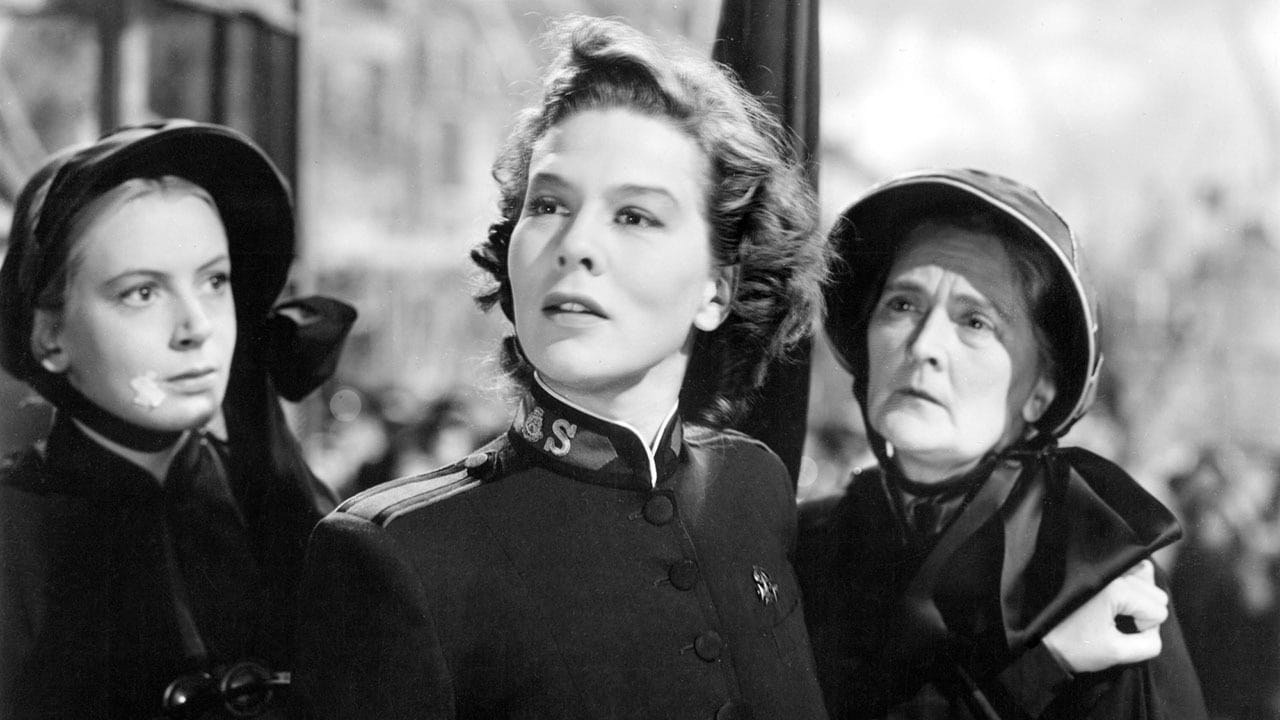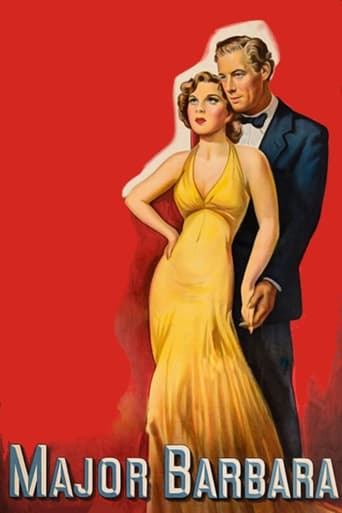



Strong and Moving!
Let's be realistic.
Too much about the plot just didn't add up, the writing was bad, some of the scenes were cringey and awkward,
View MoreExcellent and certainly provocative... If nothing else, the film is a real conversation starter.
View MoreYou know what they say, if you're still an activist at 40, there must be something wrong with you. When faced with the cold hard truth that no money is kosher money, Major Barbara can relax and enjoy being rich. Just like with every activist, her manner of speaking is at least half a century old and she sounds like a Victorian spinster. The film seems to be set in the flappers era, so you can imagine how comical she must be. Wendy Hiller is a great actress and I'm sorry she didn't make more films and Rex Harrison is her equal. Deborah Kerr appears in a minor role, good from the start (this is her first film). Anyway, they speak too much and too fast, which maybe makes things unclear for most viewers, but that was not typical only of Bernard Shaw, but also of the screwball comedies of that period, which was actually ending by the time this film was released. You can still see the great Art Deco design during the factory visit scenes, photographed in beautiful B&W.
View MoreMajor Barbara is NOT a love song to capitalism. Geo Bernard Shaw was a Fabian Socialist (WHAAAAA? never mind unless you like political esoterica, especially of the 1930s). For all those too young to know any better, Socialism, when it was practiced in the old dead Soviet bloc, was an even bigger and greater extoller of factory/industrial activity than capitalism ever has been. Governments back then slaughtered millions just to build factories so their survivors could produce industrial stuff for the State. So factories and industry was celebrated like crazy as the savior of all future society. THAT is what you see in Major Barbara. To give a contemporary contrast, Obama's healthcare is NOT socialism but fascism, written of by and for the insurance industry to force Americans to buy A PRODUCT FOR PRIVATE PROFIT, which is a hint as to the ideology behind Major Barbara: IT AIN'T CAPITALISTIC, it just looks that way to the 21st century mind bereft of political knowledge about (at least) the first half of the 20th. To think about almost anything as "socialistic" today is laughable compared to actual socialism as actually practiced, back in the day.Why then does Robert Morley's character go on about how he's saving the world by making weapons, among the other capitalistic but actually socialistic-APPEARING products he builds? Because when they filmed this, there was a war going on which at that point no one knew for certain whether they'd be forced to speak German in a few years as a result of it. If Shaw had to help win the war in a then-completely capitalistic Britain, he'd do it by applauding greed as he does, in hopes that afterward the majority of the population would prefer socialism in, e.g., THEIR health care, among other facets of life, which compared to the US is what followed. That's why the emphasis is so much on the military production overcoming the qualms about too much of it. (Both sides of that discussion, in the face of the German threat and in the face of permanent war afterward, were right.)
View MoreNo doubt influenced by the success of Pygmalion producer/director Gaby Pascal followed up three years later with a second GBS polemic masquerading as a play, in this case that old chestnut God versus Mammon best out of three, Major Barbara. Wendy Hiller had scored a personal triumph as Eliza Doolittle in Pygmalion so here she is again as the eponymous Salvation Army lass whose father happens conveniently to be a munitions manufacturer. One of the problems with Shaw in this vein is that he tended to animate cyphers rather than create flesh-and-blood characters and here a group of actors from stage and screen do what they can with what they are given to work with. There's little discernible chemistry between Hiller and Rex Harrison, Robert Morley pays homage to Charles Laughton, Emlyn Williams phones it in and it's left to stage actress Marie Lohr to provide a touch of class. Elsewhere Bobby Newton offers a prototype Bill Sikes (possibly encouraged by Editor David Lean who also gets a co-director credit. Stanley Holloway gets a strangely long opening sequence for an uncredited role and in her film debut Deborah Kerr gives little indication of the durable career to come. A curio more than anything else.
View MoreShaw decided to pose the question of whether money or religion leads to morality. It is a treat to see a screenplay written by the playwright...and the cast and performance were, to all reports, quite pleasing to Mr. Shaw. I certainly think that the cast and performance are excellent. Shaw based the central theme on the life of John Cadbury, the founder of the Cadbury chocolate business. Mr. Cadbury was a Quaker who spent much of his life working for social reform. The two major characters are Andrew Undershaft and his daughter, Barbara. Shaw could not make his protagonist a socially aware candy manufacturer - so Andrew Undershaft is cast as an arms merchant and his daughter, Barbara, who rejects the family business as immoral and joins the Salvation Army.Shaw plays the arms merchant's money off against the religion that Barbara has adopted and asks questions about the social compact, the origins of crime and criminal behavior and morality that were scandalous when the play was written 100 years ago and remain scandalous today.I don't know how this film came to be classified as a comedy - it is serious social commentary of the highest sort.
View More